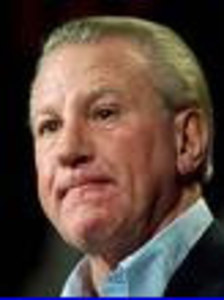Over the past 10 days, it has been fascinating to behold the reaction in the rest of the country to Premier Dalton McGuinty's drawing of a line in the sand on equalization payments.
McGuinty has variously been accused of: abandoning Ontario's role as "the big brother in Confederation" (Prince Edward Island Premier Pat Binns); "taking the car and the credit card and leaving those of us with less resources in the family behind" (Binns again); having a "narrow vision" of the country (Quebec Premier Jean Charest); committing an "act of aggression" (unnamed provincial official quoted in the Winnipeg Free Press); setting "a perilous course" (editorial in the Montreal Gazette); "sacrificing the national interest" (column in Montreal's La Presse); adopting a "me-first" attitude (editorial in the Saint John Telegraph-Journal); and raising victimhood to "pathetic proportions" (editorial in the Saskatoon Star-Phoenix).
What prompted this outpouring of scorn was a news release issued by McGuinty at the conclusion of last week's meeting of the premiers in Montreal.
The news release said that notwithstanding the recommendations of a task force report that the premiers had commissioned, Ontario "just can't afford" to pay more into the equalization program, which subsidizes the "have-not" provinces (all but Ontario, Alberta and, for the moment, Saskatchewan).
The task force had recommended changing the equalization formula in a way that would enrich the program by up to $5.7 billion.
The money would come from Ottawa, not the treasuries of the "have" provinces. But, as McGuinty pointed out, 43 cents of every federal tax dollar comes from Ontario taxpayers. Thus, a $5.7 billion increase in the program would cost Ontario taxpayers $2.45 billion.
McGuinty did not call for the scrapping of the equalization program. But he noted that equalization payments to the have-not provinces have already risen 30 per cent over the past four years and suggested a further enrichment was unreasonable.
For this he was vilified and accused of departing from the traditional Ontario role. "Ontario's government has been the family-oriented big brother of Confederation, concerned to use its wealth judiciously for the benefit of all," editorialized the Montreal Gazette. "No more."
This is an ahistorical view - or, at least, it ignores Ontario's history since 1994. McGuinty has, in fact, been following in the footsteps of New Democratic and Conservative premiers before him.
Up to 1994, Ontario was, indeed, the Boy Scout of Confederation, willing to make sacrifices, both fiscal and constitutional, to hold the country together.
Ontario's motives were not entirely altruistic - the rest of the country provided a market for its goods and services.
But two events helped to change Ontario's perspective: the 1988 free trade deal with the United States, which accelerated the shift from the rest of Canada to the United States as Ontario's primary market; and the harsh recession of the early 1990s, which drove the provincial deficit sky-high.
By 1994, NDP premier Bob Rae had had enough and delivered his famous "fair share" speech in the Ontario Legislature.
"There must be no more discriminatory treatment against Canadians living in Ontario," said Rae. "Ontario supports the equalization program, but beyond this, Ontario must receive its fair share, and Ontarians must not be treated differently than people in other provinces. The systematic discrimination against Ontario must stop."
Mike Harris, Rae's successor as premier, used even more colourful language. When Newfoundland and Nova Scotia demanded that they keep receiving equalization payments even as their coffers were being enriched by offshore oil and gas royalties, Harris memorably responded: "That's like somebody on welfare saying, `Well, I won the million-dollar lottery and I have a $100,000 job, but I still want my welfare.'"
McGuinty has been more diplomatic in his language, but he is making the same essential point as Rae and Harris: Enough is enough.
Other provinces look at Ontario's overall wealth and say it can afford to be more generous.
But a closer look reveals some startling statistics: Ontario ranks ninth among provinces (ahead of only Manitoba) in spending on hospitals, for example, and dead last in spending on colleges and universities. Ontario is also just one of two provinces (P.E.I. is the other) running a deficit.
Given these numbers, it does not make a lot of sense to send even more money from Ontario taxpayers to other provinces to help them "equalize" their public-sector services.
One solution - also recommended by the premiers' task force - would be a simultaneous increase of $4.9 billion in federal transfer payments that go to all the provinces for health, education and welfare.
But Ontario's share of that - $1.9 billion - would not even offset the outflow from the province for the recommended enhancement of equalization payments. And that is assuming Ottawa can afford to do both - a big assumption.
The best solution, from Ontario's point of view, would be a transfer of "tax points" from Ottawa to the provinces. That is something for McGuinty to discuss whenever he finally meets with Prime Minister Stephen Harper.
Whether Harper will pay any attention, given the scornful reaction to Ontario in the rest of the country, is another question.
Biggest province not the cash cow it once was
McGuinty position on equalization universally scorned



































Laissez un commentaire Votre adresse courriel ne sera pas publiée.
Veuillez vous connecter afin de laisser un commentaire.
Aucun commentaire trouvé